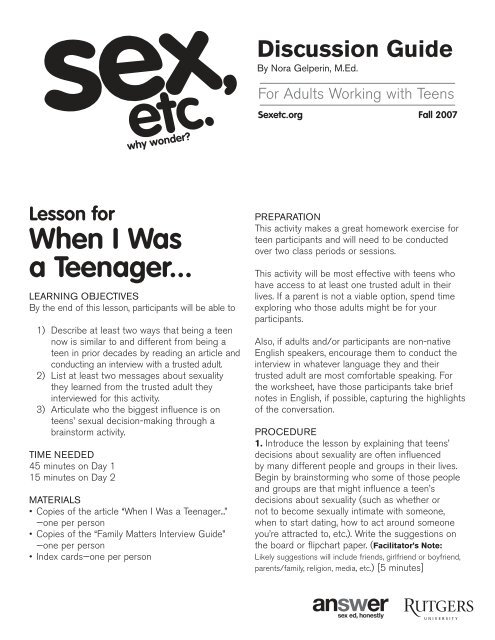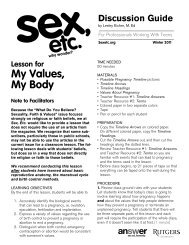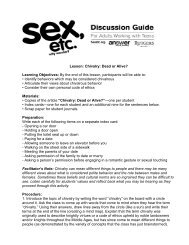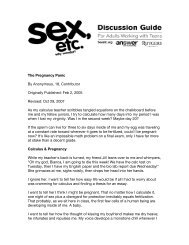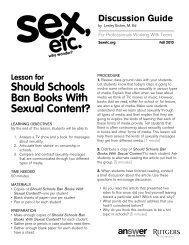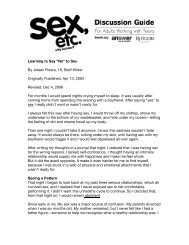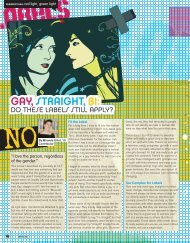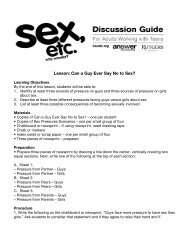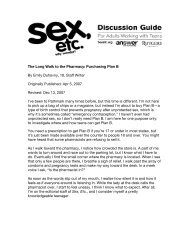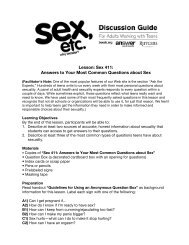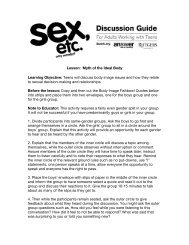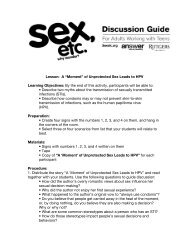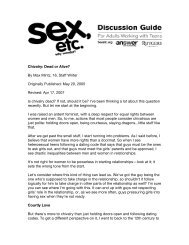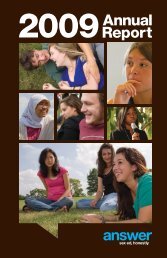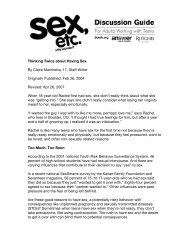When I Was a Teenager... - Answer
When I Was a Teenager... - Answer
When I Was a Teenager... - Answer
Create successful ePaper yourself
Turn your PDF publications into a flip-book with our unique Google optimized e-Paper software.
Lesson for<br />
<strong>When</strong> I <strong>Was</strong><br />
a <strong>Teenager</strong>...<br />
LEARNING OBJECTIVES<br />
By the end of this lesson, participants will be able to<br />
1) Describe at least two ways that being a teen<br />
now is similar to and different from being a<br />
teen in prior decades by reading an article and<br />
conducting an interview with a trusted adult.<br />
2) List at least two messages about sexuality<br />
they learned from the trusted adult they<br />
interviewed for this activity.<br />
3) Articulate who the biggest influence is on<br />
teens’ sexual decision-making through a<br />
brainstorm activity.<br />
TIME NEEDED<br />
45 minutes on Day 1<br />
15 minutes on Day 2<br />
MATERIALS<br />
• Copies of the article “<strong>When</strong> I <strong>Was</strong> a <strong>Teenager</strong>...”<br />
—one per person<br />
• Copies of the “Family Matters Interview Guide”<br />
—one per person<br />
• Index cards—one per person<br />
Discussion Guide<br />
By Nora Gelperin, M.Ed.<br />
For Adults Working with Teens<br />
Sexetc.org Fall 2007<br />
PREPARATION<br />
This activity makes a great homework exercise for<br />
teen participants and will need to be conducted<br />
over two class periods or sessions.<br />
This activity will be most effective with teens who<br />
have access to at least one trusted adult in their<br />
lives. If a parent is not a viable option, spend time<br />
exploring who those adults might be for your<br />
participants.<br />
Also, if adults and/or participants are non-native<br />
English speakers, encourage them to conduct the<br />
interview in whatever language they and their<br />
trusted adult are most comfortable speaking. For<br />
the worksheet, have those participants take brief<br />
notes in English, if possible, capturing the highlights<br />
of the conversation.<br />
PROCEDURE<br />
1. Introduce the lesson by explaining that teens’<br />
decisions about sexuality are often influenced<br />
by many different people and groups in their lives.<br />
Begin by brainstorming who some of those people<br />
and groups are that might influence a teen’s<br />
decisions about sexuality (such as whether or<br />
not to become sexually intimate with someone,<br />
when to start dating, how to act around someone<br />
you’re attracted to, etc.). Write the suggestions on<br />
the board or flipchart paper. (Facilitator’s Note:<br />
Likely suggestions will include friends, girlfriend or boyfriend,<br />
parents/family, religion, media, etc.) [5 minutes]
2. Next, ask participants to look at the list on the<br />
flipchart and select who teens feel have the biggest<br />
influence on their sexual decisions. Entertain a<br />
variety of guesses from participants. Explain that<br />
according to research, teens feel that their parents<br />
are the biggest influence on their sexual decisionmaking.<br />
[2 minutes]<br />
3. Again, looking at the list, ask participants to<br />
imagine that they were parents of teenagers. Ask<br />
them, in their role as parents, to look at the list and<br />
guess who has the biggest influence on a teen’s<br />
sexual decision-making. Entertain a variety of<br />
guesses. Explain that most parents believe that<br />
peers are the biggest influence on teens’ sexual<br />
decision-making. [8 minutes]<br />
4. Point out to participants that parents are teens’<br />
biggest influence on sexual decision-making, but<br />
many parents feel like it’s their teens’ friends<br />
who are the biggest influence. Explain that in<br />
order to encourage teens and trusted adults to<br />
communicate about sexual issues, the assignment<br />
is for the participants to select an adult that they<br />
trust and interview them. Participants can select<br />
any adult they feel comfortable talking to about<br />
sexuality issues. It need not be their parents, but it<br />
must be someone who is at least ten years older<br />
than the participant, if possible. [2 minutes]<br />
5. Explain that there is a great example of an<br />
adult-teen interview that you would like each<br />
participant to read. Distribute copies of the article<br />
“<strong>When</strong> I <strong>Was</strong> a <strong>Teenager</strong>...” and read aloud with<br />
participants. [8 minutes]<br />
6. Ask the following questions:<br />
• What are two things that Josh and Bernard<br />
have in common?<br />
• What are two things that are different about<br />
Josh and Bernard?<br />
• If you were Bernard, what do you think you<br />
could teach Josh about?<br />
• If you were Josh, what do you think you could<br />
teach Bernard about?<br />
[15 minutes]<br />
7. Next, distribute copies of the the “Family Matters<br />
Interview Guide” and explain when the assignment<br />
is due (given the schedule of your next meeting<br />
time). Ask if there are any questions about the<br />
assignment. If not, close exercise by expressing<br />
how much you are looking forward to hearing about<br />
what your participants learn from the adults in their<br />
lives. [5 minutes]<br />
8. Resume the lesson on day two when your<br />
participants have had a chance to conduct the<br />
interview with a trusted adult in their lives.<br />
Distribute an index card to each participant. Ask<br />
each participant to look at the last page of his or<br />
her interview guide, where it reads, “Two things I<br />
learned as a result of this interview are,” and<br />
select one thing to anonymously write on the<br />
index card.<br />
After participants have written on their index cards,<br />
collect them, shuffle them and then collect their<br />
“Family Matters Interview Guide” worksheets.<br />
Lastly, redistribute the index cards to participants,<br />
so that each participant has an index card, but not<br />
his or her own. [10 minutes]<br />
9. Ask participants to go around and read what is<br />
listed on their index card. Close the lesson by having<br />
participants complete the following statement:<br />
“As a result of participating in this activity, one thing<br />
I will take away is...” [5 minutes]
Family<br />
Matters<br />
Interview Guide<br />
Read this section to the adult you have chosen to interview:<br />
I have been assigned this interview as part of my sex education class. There are 12 questions, and<br />
it should only take 15 minutes to complete. The goal is for me to better understand what it was<br />
like to be a teenager when you grew up. Thanks for your time.<br />
Name of the adult you are interviewing:<br />
Relationship to the adult you are interviewing:<br />
How long have you known this adult?<br />
First, I have a few questions to help you think back to when you were growing up.<br />
1) What was your favorite place to hang out with your friends?<br />
2) What did you do to have fun with your friends?<br />
3) What was your favorite TV show?<br />
4) What was your favorite movie?<br />
5) What was your favorite song?
Next I have a few questions about what it was like learning about sex ed when you were growing up.<br />
6) What do you remember learning about sexuality from your parents or family?<br />
7) What do you remember about puberty when you were growing up?<br />
8) Did you ever have a crush on someone? If so, what was that like for you?<br />
Next, comparing what it’s like to be a teenager today versus what it was like to be a teenager when<br />
you grew up…<br />
9) Can you describe something you think is the same now as it was when you were a teen?<br />
10) Can you describe something you think is different now than when you were a teen?<br />
11) Is there anything you know now that you wish you had known as a teenager?<br />
12) Do you have any final thoughts or issues you want to talk about?
Questions for Participant to Complete After the Interview<br />
A) What are two things that are different about being a teen today versus when this adult was a teen?<br />
B) What are two things that are the same about being a teen today versus when this adult was a teen?<br />
C) What are two things you learned as a result of conducting this interview?<br />
1)<br />
2)


